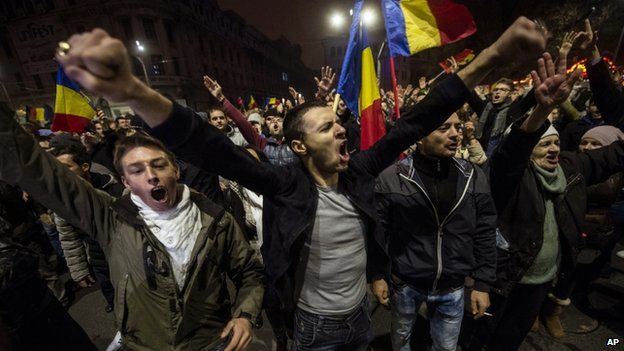Romania election surprise as Klaus Iohannis wins presidency
- Published

Opposition candidate Klaus Iohannis has won a surprise victory in Romania's presidential election, defeating PM Victor Ponta after a tight race.
With most results declared, Mr Iohannis, mayor of Sibiu, had 54.5% of the vote to Mr Ponta's 45.5%.
Mr Iohannis, 55 and an ethnic German, vowed to change politics and said "another kind of Romania is beginning".
Romania is one of the most corrupt EU states, something the centre-right Mr Iohannis has vowed to tackle.
Despite the election result, Mr Ponta told a local TV channel that he had "no reason to resign" as prime minister.
He had hoped to become the country's youngest president, replacing the incumbent Traian Basescu who cannot stand for re-election after serving two terms.
Klaus Iohannis - Romania's president-elect
- Made his name as mayor of Sibiu, a major tourist destination in Transylvania
- A Protestant former physics teacher from Romania's ethnic German minority
- Ethnic German minority dates back to 12th Century but most left after the 1989 fall of dictator Ceausescu
- Campaigned against corruption
- Became leader of Liberal party (PNL) in June
Diaspora decides
Romania's large diaspora of up to four million people played a key role in the election. Many expat voters were said to be disillusioned with Mr Ponta.
After the first round of voting there were protests at polling stations in Paris, London and other cities. In some places voters had to queue for hours - with some unable to vote - leading to the resignation of the foreign minister last week.
The number of expatriate voters on Sunday more than doubled to 379,000 and large queues thronged polling stations at embassies and consulates across Europe, from Milan and Munich to London and Portsmouth.
Police in Paris fired tear gas on Sunday evening to disperse voters angry that they had been unable to cast their ballots. The new foreign minister had suggested that voters in France should travel instead to the eastern city of Nancy.
Romanian media praise election result
- Evenimentul Zilei newspaper: "It was not Klaus Iohannis who persuaded people to vote for him, but the arrogant attitude of [Ponta's] PSD party which triggered a popular backlash"
- Mediafax news agency: "The presidential election has been won by patient voters and lost by the authorities"
- Dumitru Bortun, pundit on Digi24 TV website: "Romania has reached a level where it can think about its political interests beyond ethnic backgrounds, language, religion, beyond these outdated and medieval identity issues"
Mr Ponta had been leading in the opinion polls and had beaten Mr Iohannis, the mayor of Sibiu in Transylvania, in the first round of the presidential election.
"We are a democratic country," Mr Ponta said outside the headquarters of his Social Democratic Party on Sunday. "The people are always right."
Mr Ponta, 42, had promised to reduce the budget deficit, increase pensions and the minimum wage.
As prime minister, he oversaw economic growth and political stability in Romania, the EU's second-poorest state after Bulgaria.
Aside from tackling corruption, Mr Iohannis, 55, promised in his election campaign to strengthen the independence of the judicial system.
- Published17 November 2014
- Published17 November 2014
- Published16 November 2014
- Published3 November 2014
- Published8 October 2018